Chemical Reactions
Chemical reactions are processes in which one or more substances are converted into new substances. These reactions involve the breaking of chemical bonds in the reactants and the formation of new bonds in the products. Understanding chemical reactions is fundamental to the study of chemistry, as they are central to the production of new materials, energy, and the functioning of biological systems.
Types of Chemical Reactions
There are several types of chemical reactions, including:
- Synthesis Reactions: Two or more substances combine to form a single, more complex substance. The general form of a synthesis reaction is A + B → AB.
- Decomposition Reactions: A single compound breaks down into two or more simpler substances. The general form of a decomposition reaction is AB → A + B.
- Single Replacement Reactions: An element and a compound react to form a different element and a different compound. The general form of a single replacement reaction is A + BC → AC + B.
- Double Replacement Reactions: Two compounds exchange ions to form two new compounds. The general form of a double replacement reaction is AB + CD → AD + CB.
- Combustion Reactions: A substance reacts with oxygen gas, producing carbon dioxide and water. The general form of a combustion reaction is CxHy + O2 → CO2 + H2O.
Factors Affecting Chemical Reactions
Several factors can affect the rate and outcome of chemical reactions, including:
- Temperature: Higher temperatures generally increase the rate of reaction by providing more kinetic energy to the reactant molecules, leading to more frequent and energetic collisions.
- Concentration of Reactants: Higher concentrations of reactants usually lead to increased reaction rates because there are more reactant molecules available to collide and react.
- Catalysts: Catalysts are substances that can increase the rate of a reaction without being consumed. They work by providing an alternative reaction pathway with lower activation energy.
- Surface Area: For reactions involving solids, increasing the surface area of the solid reactant can lead to a higher reaction rate because there is more area available for collisions to occur.
Balancing Chemical Equations
Chemical equations represent the identities and relative quantities of reactants and products in a chemical reaction. Balancing chemical equations is essential to ensure that the law of conservation of mass is obeyed, meaning that the same number and type of atoms are present in the products as in the reactants.
The process of balancing chemical equations involves adjusting the coefficients of the chemical formulas to ensure that the same number of each type of atom is present on both sides of the equation.
Stoichiometry
Stoichiometry involves the quantitative relationships between reactants and products in chemical reactions. This includes determining the amount of products that can be produced from a given amount of reactants, as well as calculating the amount of reactants needed to produce a certain amount of products.
Study Guide
When studying chemical reactions, it's important to focus on the following key concepts:
- Understanding the different types of chemical reactions and being able to identify and write balanced chemical equations for each type.
- Recognizing the factors that influence the rate of chemical reactions and being able to explain how these factors affect reaction rates.
- Mastering the skill of balancing chemical equations and understanding the importance of the law of conservation of mass in chemical reactions.
- Practicing stoichiometry problems to become proficient in calculating the quantities of reactants and products in chemical reactions.
By mastering these concepts, you will develop a strong foundation in understanding and applying chemical reactions in various contexts.
Remember to practice solving a variety of problems and to seek help from your teacher or tutor if you encounter challenges in understanding specific concepts.
Good luck with your studies!
[Chemical Reactions] Related Worksheets and Study Guides:
.◂Chemistry Worksheets and Study Guides High School. Chemical Reactions
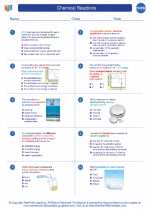
 Worksheet/Answer key
Worksheet/Answer key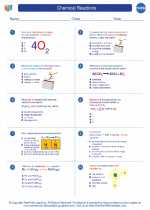
 Worksheet/Answer key
Worksheet/Answer key
 Worksheet/Answer key
Worksheet/Answer key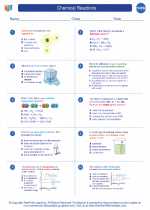
 Worksheet/Answer key
Worksheet/Answer key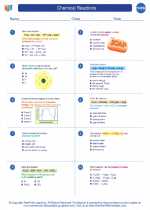
 Worksheet/Answer key
Worksheet/Answer key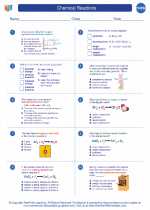
 Vocabulary/Answer key
Vocabulary/Answer key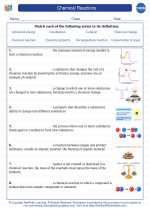
 Vocabulary/Answer key
Vocabulary/Answer key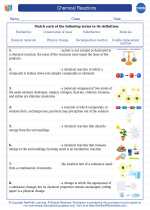
 Vocabulary/Answer key
Vocabulary/Answer key
